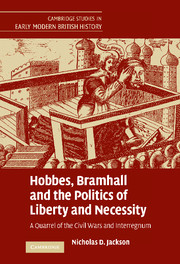 Hobbes, Bramhall and the Politics of Liberty and Necessity
Hobbes, Bramhall and the Politics of Liberty and Necessity Book contents
- Frontmatter
- Contents
- Acknowledgments
- List of abbreviations
- Note on dates and style
- Introduction
- 1 Bishop Bramhall, the ‘Great Arminian’, ‘Irish Canterbury’ and ‘Most Unsound Man in Ireland’, 1633–1641
- 2 Bishop Bramhall, the Earl of Newcastle, Thomas Hobbes and the First English Civil War
- 3 Hobbes's flight to France, De Cive and the beginning of the quarrel with Bramhall, summer 1645
- 4 An epistolary skirmish, 1645–1646: Bramhall's ‘Discourse’, Hobbes's ‘Treatise’ and Bramhall's ‘Vindication’
- 5 Bramhall and the royalist schemes of 1646–1650
- 6 Hobbes and Leviathan among the exiles, 1646–1651
- 7 The public quarrel: Hobbes, Of Liberty and Necessity, 1654, Bramhall, Defence of True Liberty, 1655 and Hobbes, Questions concerning Liberty, Necessity and Chance, 1656
- 8 Castigations of Hobbes's Animadversions and The Catching of Leviathan, 1657–1658: Hobbes as Leviathan of Leviathans
- 9 The Restoration and death of Bramhall and Hobbes's last word, 1668
- Conclusion
- Bibliography
- Index
- Cambridge Studies in Early Modern British History
6 - Hobbes and Leviathan among the exiles, 1646–1651
Published online by Cambridge University Press: 17 July 2009
- Frontmatter
- Contents
- Acknowledgments
- List of abbreviations
- Note on dates and style
- Introduction
- 1 Bishop Bramhall, the ‘Great Arminian’, ‘Irish Canterbury’ and ‘Most Unsound Man in Ireland’, 1633–1641
- 2 Bishop Bramhall, the Earl of Newcastle, Thomas Hobbes and the First English Civil War
- 3 Hobbes's flight to France, De Cive and the beginning of the quarrel with Bramhall, summer 1645
- 4 An epistolary skirmish, 1645–1646: Bramhall's ‘Discourse’, Hobbes's ‘Treatise’ and Bramhall's ‘Vindication’
- 5 Bramhall and the royalist schemes of 1646–1650
- 6 Hobbes and Leviathan among the exiles, 1646–1651
- 7 The public quarrel: Hobbes, Of Liberty and Necessity, 1654, Bramhall, Defence of True Liberty, 1655 and Hobbes, Questions concerning Liberty, Necessity and Chance, 1656
- 8 Castigations of Hobbes's Animadversions and The Catching of Leviathan, 1657–1658: Hobbes as Leviathan of Leviathans
- 9 The Restoration and death of Bramhall and Hobbes's last word, 1668
- Conclusion
- Bibliography
- Index
- Cambridge Studies in Early Modern British History
Summary
Thomas Hobbes and the Marquess of Newcastle both lived in Paris in the years 1646–8. They travelled some during this period, but not nearly as much as Bishop Bramhall. Among other things, the philosopher seems to have been working intermittently, and painfully slowly, on what would be published in 1655 as De Corpore. Early in 1646 Hobbes was busy preparing the second edition (first publication) of De Cive. His French friend in Amsterdam, Samuel Sorbière, supervised the publication by the Dutch firm Elzevir. Hobbes was planning to spend the summer of 1646 in Mountauban, in southern France, where he would stay with his young friend, Thomas de Martel, and where he hoped to work uninterruptedly on De Corpore. Meanwhile, having just left Jersey, Prince Charles arrived in Paris in July 1646, to spend the next few years alongside his mother, Henrietta Maria, at St Germain. For Hobbes, Languedoc and De Corpore would have to wait, for shortly after the arrival of Newcastle's former royal pupil, Hobbes was appointed to teach mathematics to the future King Charles II. The arrangement was for Hobbes to teach the sixteen-year-old boy mathematics for one hour and Dr John Earle, the anglican divine, to instruct him in religion and other subjects for another hour. Earle was a good friend of Hyde from Great Tew days, both had been with the prince in Jersey, and the two corresponded while Hyde remained at Jersey and Earle moved on to Paris to be with the prince.
- Type
- Chapter
- Information
- Hobbes, Bramhall and the Politics of Liberty and NecessityA Quarrel of the Civil Wars and Interregnum, pp. 146 - 179Publisher: Cambridge University PressPrint publication year: 2007


